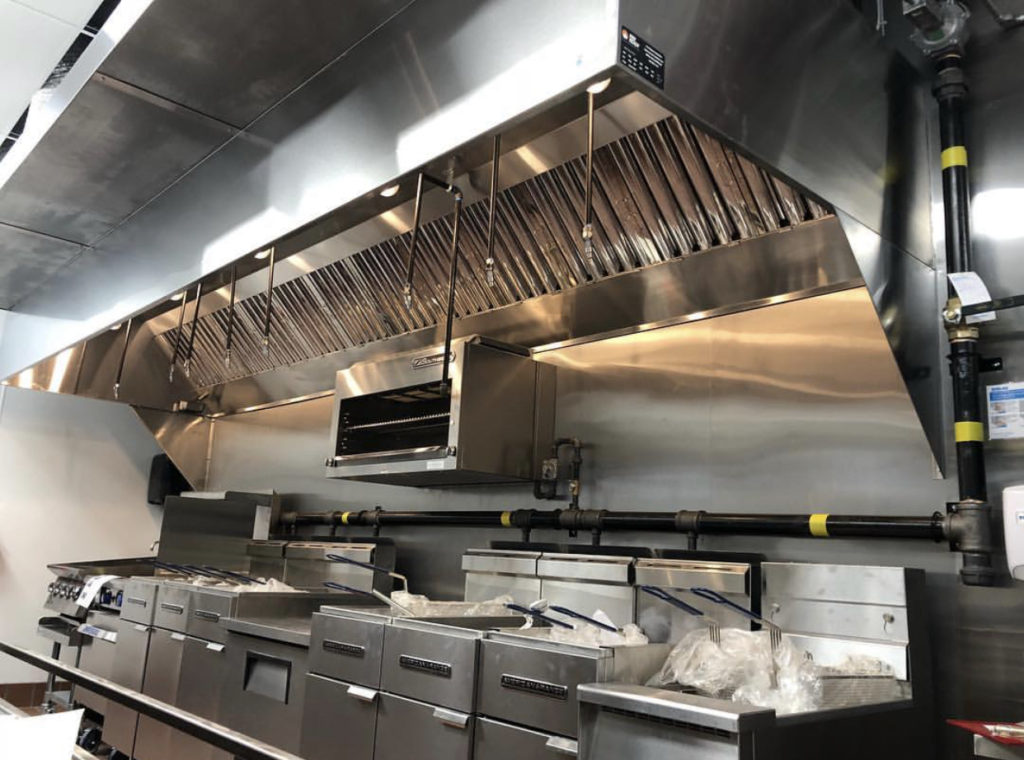Operating a busy commercial kitchen requires following many standards and regulations, like the National Fire Protection Association (NFPA) 96. This code states that every commercial cooking area should have kitchen fire systems to protect against accidental fires.
Public and private kitchens have a higher risk of fire emergencies than other industries, and fires can happen anytime. It’s crucial for a commercial kitchen to install kitchen hood systems and fire alarms and have them tested regularly to ensure your restaurant is protected.
If you are in the process of opening your public or private kitchen, following every standard can be overwhelming. However, it’s vital to understand how to prepare for your suppression system installation so that you can open your business as scheduled.
What Are Kitchen Fire Systems?
Kitchen hood systems connect to the hood of your cooking range and its fuel line. If a fire starts, the system automatically activates three responses.
First, the fuel source to the oven or stovetop shuts off. Then, the system releases a fire suppressant from nozzles installed in the hood. Finally, the hood’s ventilation feature simultaneously turns on to reroute smoke out of the building.
This three-tiered system reduces the potential for kitchen damage. Having this system installed could be the difference between closing your kitchen for repairs or quickly returning to work. Sometimes, dining patrons may not even be aware of the incident.
What to Expect During the Installation
The installation process takes numerous phases to complete, some of which are your responsibility to take care of before the installers arrive.
You can simplify the process by breaking it down into four phases:
- Phase One: Preparing for the installation
- Phase Two: Professional installation
- Phase Three: Preparing for the final inspection and test
- Phase Four: The fire marshall performing a final test
You can only open your kitchen once the fire marshall approves the final inspection and acceptance test.
Preparing for Your Kitchen Fire Systems Installation
Before your professional installation team can complete the installation of your commercial fire alarm and suppression system, you must put several things in place.
Follow this checklist to ensure your kitchen is prepared for the task:
- Confirm the hood is correctly installed
- Verify ceiling accessibility above the hood
- Ensure all appliances have electrical power
- Confirm the fuel valve is installed and accessible
- Verify the pull station is up to code
- Ensure you have all necessary equipment on site and located in the correct space
If you are installing a wall-mounted system, make sure that the wall is finished where the installers will mount it.
Kitchen Fire System Inspections
Before officially opening your kitchen, the fire marshall or other authority having jurisdiction (AHJ) must confirm that it is ready to use. This inspection is the final step to ensure your commercial space is safe and prepared to open.
Every local governing body has different requirements for what qualifies as passing the approval test. Before scheduling your appointment, you’ll want to ensure that the kitchen fire system is installed and ready. This can help you minimize potential delays and fees involved with organizing a second inspection.
The NFPA inspector looks for the following:
- All appliances that deactivate when the system turns on
- An HVAC system or air fan connected to the fire suppression system
- A continuous-running exhaust fan
- A heat detector integrated with fan controls
- An operational link between the building’s fire alarm and suppression system
- K class or ABC fire extinguishers
- Operable gas light indicators
- A working connection between the hood and heat detectors
- Room temperature sensors
After the fire marshall completes this inspection, your restaurant and kitchen fire systems will be confirmed to comply with NFPA standards.
The Right Fire Safety Equipment Is Key
By installing a suitable system for your commercial kitchen, you can protect your staff and customers, your cooking area, and your business. At Preventive Fire, we provide commercial-grade fire and safety equipment that businesses throughout South Florida continue to trust. Contact us to learn about our high-quality products today.

